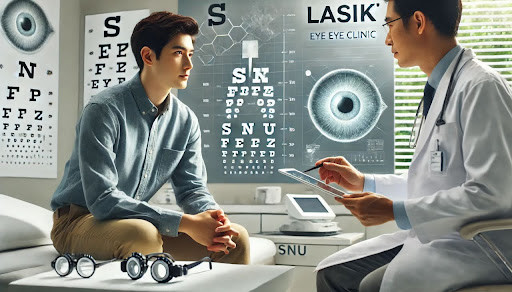The Importance of Regular Eye Exams in Ophthalmology Care
Our eyes are one of the most vital organs, allowing us to experience the world visually and perform everyday tasks. Yet, many people overlook the importance of regular eye exams, often only visiting an ophthalmologist relex smile or optometrist when vision problems become noticeable. However, routine eye exams are a cornerstone of effective ophthalmology care, playing a crucial role in preserving vision, detecting diseases early, and maintaining overall eye health.

Why Regular Eye Exams Matter
Regular eye exams do much more than just update your glasses prescription. They are comprehensive evaluations that help detect vision changes, eye diseases, and even systemic health issues before symptoms appear. Early detection and treatment are essential in preventing vision loss and ensuring long-term eye health.
Detecting Vision Changes Early
Vision can change gradually over time, and sometimes changes are so subtle that you may not even notice. Regular eye exams help track these changes accurately, ensuring that corrective measures like glasses or contact lenses are updated accordingly. This helps prevent eye strain, headaches, and difficulties with daily activities such as reading or driving.
Screening for Eye Diseases
Many serious eye conditions develop silently, without pain or obvious symptoms in their early stages. Routine exams are critical for identifying these diseases early when they are most treatable.
Common Eye Diseases Detected in Exams
- Glaucoma: Often called the “silent thief of sight,” glaucoma gradually damages the optic nerve due to increased intraocular pressure. Early diagnosis through regular eye pressure measurements and optic nerve evaluation can prevent irreversible vision loss.
- Age-Related Macular Degeneration (AMD): This condition affects the central part of the retina, impairing sharp vision. Early detection through retinal imaging and examinations allows for timely intervention.
- Cataracts: Though common with aging, cataracts can initially be subtle. Detecting them early helps patients plan for surgery before significant vision impairment occurs.
- Diabetic Retinopathy: For people with diabetes, routine eye exams are crucial to identify retinal blood vessel damage before vision loss occurs.
- Retinal Detachment and Other Conditions: Early signs of retinal tears or detachments can be spotted during comprehensive exams, potentially saving vision through prompt treatment.
Monitoring Systemic Health Through Eye Exams
The eyes often reflect overall health. During an eye exam, an ophthalmologist can spot signs of systemic conditions such as high blood pressure, diabetes, autoimmune diseases, and even certain neurological disorders. For example:
- Changes in blood vessels in the retina can indicate hypertension.
- Swelling or bleeding may signal diabetic complications.
- Optic nerve changes can suggest multiple sclerosis or increased intracranial pressure.
This makes eye exams an invaluable tool not only for eye health but for broader medical evaluation.
Who Should Get Regular Eye Exams?
While everyone benefits from eye exams, certain groups should prioritize them:
- Children: Early eye exams help detect issues like lazy eye (amblyopia), strabismus, or refractive errors that can affect learning and development.
- Adults aged 40 and older: Risk for conditions like glaucoma and cataracts increases with age.
- People with diabetes or hypertension: Regular screening is vital to catch and manage complications.
- Those with a family history of eye diseases: Genetics can increase risk.
- Anyone experiencing vision changes or eye discomfort: Prompt evaluation can diagnose and treat problems early.
What Happens During a Regular Eye Exam?
A typical comprehensive eye exam involves several steps:
- Medical History Review: Discussing your health, family history, and any vision concerns.
- Visual Acuity Test: Measuring sharpness of vision using an eye chart.
- Refraction Assessment: Determining the need for corrective lenses.
- Eye Pressure Measurement (Tonometry): Screening for glaucoma.
- Slit-Lamp Examination: Detailed inspection of the front eye structures.
- Dilated Fundus Exam: Using drops to widen the pupils for thorough retinal and optic nerve evaluation.
- Imaging Tests: OCT scans or retinal photography may be performed if indicated.
These tests provide a full picture of your eye health and help your ophthalmologist recommend appropriate treatment or follow-up.
How Often Should You Have Eye Exams?
The frequency of eye exams depends on age, health, and risk factors:
- Children: First exam at 6 months, then at age 3, before starting school, and annually thereafter if needed.
- Adults under 40: Every two years if no symptoms or risk factors.
- Adults over 40: Every 1-2 years to screen for age-related conditions.
- People with risk factors or existing eye conditions: May require annual or more frequent visits.
Your ophthalmologist will tailor the schedule based on your specific needs.
The Benefits of Early Detection and Treatment
Detecting eye conditions early leads to better treatment outcomes. For example:
- Early glaucoma treatment can prevent progression and irreversible vision loss.
- Timely cataract surgery can restore vision before daily life is impacted.
- Early management of diabetic retinopathy can prevent blindness.
- Detecting macular degeneration early enables lifestyle changes and treatments to slow vision loss.
In many cases, early intervention preserves independence and quality of life.
Taking Charge of Your Eye Health
While regular eye exams are vital, you can also support your vision health through:
- Protecting your eyes from UV light with sunglasses.
- Eating a balanced diet rich in leafy greens, omega-3 fatty acids, and antioxidants.
- Avoiding smoking.
- Managing chronic health conditions like diabetes and hypertension.
- Taking breaks during screen time to reduce eye strain.
Combining healthy habits with routine eye care creates the best defense against vision problems.
Conclusion
Regular eye exams are a foundational element of ophthalmology care, essential for maintaining healthy vision and preventing disease. They enable early detection of both eye-specific and systemic health issues, allowing timely treatment that can save sight and improve overall wellbeing. No matter your age or visual acuity, prioritizing comprehensive eye exams is one of the best investments you can make for your health.
Don’t wait for symptoms to appear—schedule your eye exam today and take a proactive step toward clearer, healthier vision for life.
